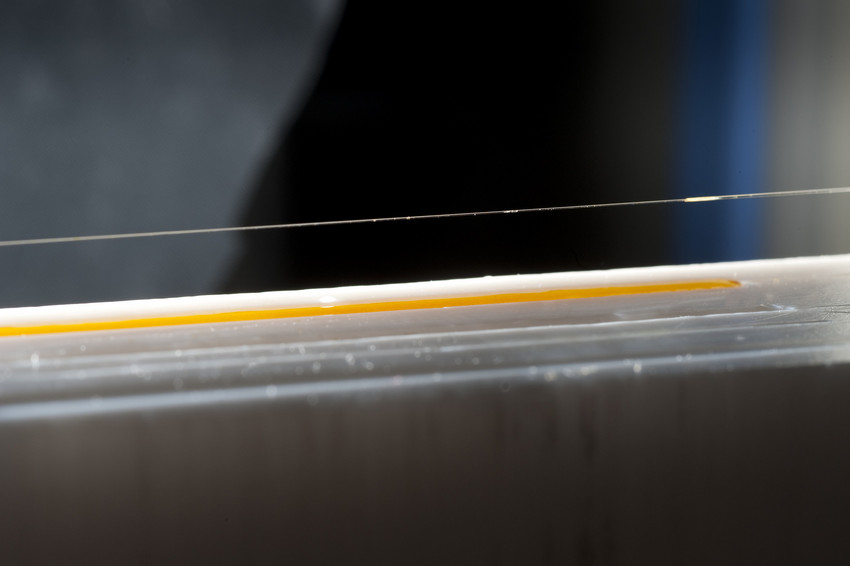Diagnostic sensors among technologies to be showcased at life science forum in Roanoke

You are in the hospital and a nurse notices a patch of red, bumpy skin. Is it MRSA (methicillin-resistant Staphylococcus aureus)? It will take two or even three days to get test results; in the meantime you are hooked up to the strongest IV antibiotics because MRSA is so resistant to treatment.
Sometimes people get medicine they don't need because rapid tests are not available. Sensors that will quickly identify pathogens are among the research being presented by university and business researchers at the Fifth Annual Southwest Virginia Life Science Forum and reception from 6:30 to 8:30 p.m. on Oct. 6 at the Virginia Tech Carilion Research Institute in Roanoke.
A team of Virginia Tech researchers are working to develop nanoscale optical fiber biosensor tests, or assays, for detection of several pathogens, including MRSA. "We have demonstrated that we can detect as few as 100 cells of MRSA in one milliliter of water in under an hour," said Randy Heflin, professor of physics in the College of Science. "We are now working on demonstrating that we can eliminate false positives when measuring real tissue swab samples that have a wide range of other biological components."
Heflin is particularly motivated. "My own daughter had a MRSA infection last summer when she was 18 months old and had to spend three days in the hospital hooked up to an IV. So I am very motivated to see this project succeed so that [general practitioners] and pediatricians could identify MRSA infections in an hour or less without having to send samples out for testing in specialized facilities with two-to-three day turnaround times."
Thomas Inzana, the Tyler J. and Frances F. Young Professor of Bacteriology in the Virginia-Maryland Regional College of Veterinary Medicine at Virginia Tech, and Heflin have grants from the National Institutes of Health, Virginia Tech Carilion Research Institute, and the National Institute for Food and Agriculture to develop rapid diagnostic tests for a number of pathogenic organisms, including MRSA. “This assay will be rugged, portable, inexpensive, and rapid,” said Inzana.
Researchers at the Virginia Bioinformatics Institute at Virginia Tech will provide information about their universal array, which can detect and identify any pathogen, or any species, without having to have its DNA sequence. "The correct identification of pathogens is essential for an appropriate response to a new infection, whether it is the annual flu or an ominous biological agent," said Skip Garner, executive director of the institute. "All current technologies to detect and identify pathogens depend on having knowledge of its genome -- its DNA sequence. This is a significant challenge if the cause of an infection is unknown."
Virginia Bioinformatics Institute's Universal Bio-Signature Detection Array has 373,000 probes that can detect synthetic as well as natural pathogens and the host being infected, whether human, other animal, or plant. It has been tested with germ cocktails and synthetic elements and can even determine the evolutionary relationships of pathogens, which can be an aid in treatment.
The goal is field deployable, robust technology. "The microarray is commercially manufactured, so it is ready for deployment," said Garner. "We are working with a company, Lynntech of College Station, Texas. to advance this technology. We would like to see a Virginia company bring it to market."
The poster about the universal detection array will be presented at the Southwest Virginia Life Science Forum by Shamira Shallom of Blacksburg, a Ph.D. candidate in the interdisciplinary genetics, bioinformatics, and computational biology program at Virginia Tech. The assay is her dissertation research project and she was first author on an article that appeared in the journal BMC Microbiology in June. Garner is her mentor.
The Southwest Virginia Life Science Forum will be an opportunity for students to learn about jobs, university scientists to meet people from Virginia's outstanding biological and medical product companies, and business people to learn about the most recent research results, which the scientists have only begun to report, and what they are working on. More than 100 academic and private sector bioscience leaders are expected to participate. Poster presentations will include biotechnology, biomaterials, nanotechnology, neuroscience, and biomedical engineering.
The forum is organized by the Virginia Biotechnology Association and the Roanoke-Blacksburg Technology Council and co-sponsored by Virginia Tech Carilion Research Institute, Fralin Life Science Institute at Virginia Tech, Novozymes, and Greenblum & Bernstein PLC.
Virginia Tech Carilion Research Institute is located at 2 Riverside Circle, Roanoke. Parking is free. Also, shuttle service will be provided from Blacksburg. There is more information online at the registration page. There is no charge to attend or participate, but registration is required.
Dedicated to its motto, Ut Prosim (That I May Serve), Virginia Tech takes a hands-on, engaging approach to education, preparing scholars to be leaders in their fields and communities. As the commonwealth’s most comprehensive university and its leading research institution, Virginia Tech offers 240 undergraduate and graduate degree programs to more than 31,000 students and manages a research portfolio of $513 million. The university fulfills its land-grant mission of transforming knowledge to practice through technological leadership and by fueling economic growth and job creation locally, regionally, and across Virginia.




